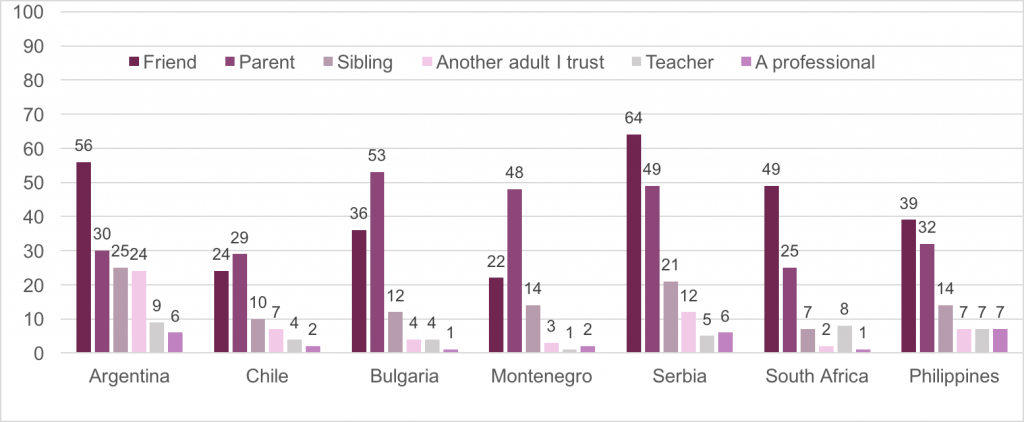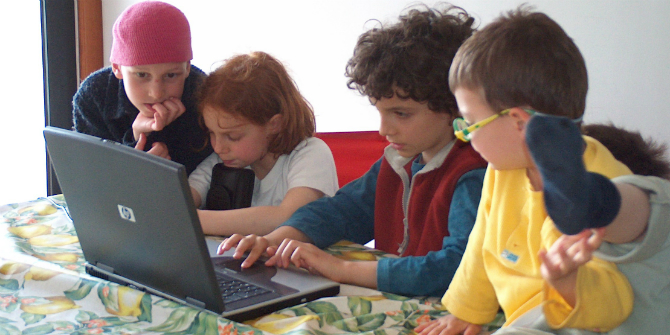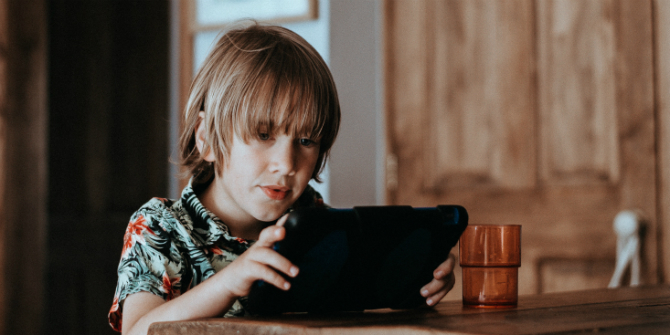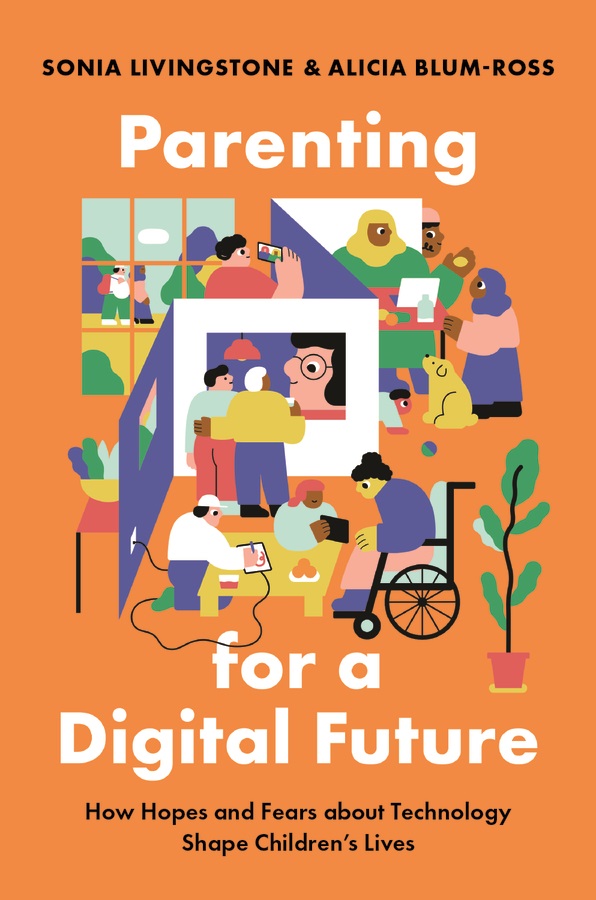 Sunday was Human Rights Day and Sonia Livingstone and Jasmine Byrne are discussing the global digital parenting divide. Presenting data from several countries of the Global Kids Online project, this post asks how can we support parents to support children around the world? Sonia is Professor of Social Psychology at LSE’s Department of Media and Communications and has more than 25 years of experience in media research with a particular focus on children and young people. She is the lead investigator of the Parenting for a Digital Future research project. Jasmina Byrne is child protection specialist with UNICEF Innocenti. [Header image credit: G. White, CC BY-SA 2.0]
Sunday was Human Rights Day and Sonia Livingstone and Jasmine Byrne are discussing the global digital parenting divide. Presenting data from several countries of the Global Kids Online project, this post asks how can we support parents to support children around the world? Sonia is Professor of Social Psychology at LSE’s Department of Media and Communications and has more than 25 years of experience in media research with a particular focus on children and young people. She is the lead investigator of the Parenting for a Digital Future research project. Jasmina Byrne is child protection specialist with UNICEF Innocenti. [Header image credit: G. White, CC BY-SA 2.0]
Children everywhere are gaining access to the internet – most often via a mobile phone. In many places, too, parents are feeling challenged in their competence, role and authority. Distinctively, internet access is bringing children access also to valued sources of knowledge and connection that their parents may lack. How are parents responding?
A digital parenting divide
Research in high income countries points to a shift away from restrictive forms of parental mediation such as banning the technology or telling their children off when a problem occurs. Instead, it seems parents are increasingly using enabling forms of mediation such as sharing some online experiences with their children and guiding them in the use of privacy settings, advice services and critical evaluation of online content and behaviour. This shift is influenced by parents’ own growing experience with and expertise in using digital media. It’s also the outcome of several years’ worth of multi-stakeholder efforts to raise parental awareness and encourage their engagement, often led by governments and child welfare organisations.
But in middle and low income countries, it seems that parents favour restrictive mediation. This is partly because some cultures are more authoritarian in their parenting style (especially in relation to daughters). It’s partly because, in the absence of supportive resources, anxious parents feel their only recourse is to protect their children by limiting their access. It’s also because the wider public debate has yet to embrace a conception of children as active citizens and, therefore now, also as digital citizens.
Even talking of parents – a common target of awareness-raising actions in the global North – is not straightforward as many children in developing countries are being brought up by relatives, often grandparents. For example, in Africa and, to a lesser extent in Latin America and the Caribbean, children are much more likely to live with either one or neither of their parents than children in other regions. Factors such as migration, illness, parental death mean that parents and caregivers are often left with little resources and time to help with their children with the digital skills. Schools are also challenged: in the least developed countries school attendance is low, pupil/teacher ratios are high, and the overcrowded classrooms and untrained teachers are common. It seems fair to conclude that in many countries, children lack a supportive and/or informed adult in their lives who can teach them to navigate the internet safely or offer support when needed.
New research findings
Understanding the real constraints families and children face in the digital world is the first step towards finding effective strategies that both parents and children can use to maximise opportunities and minimise risks. We are currently tracking the activities and experiences of children and parents in the digital age as part of our research project Global Kids Online, a multinational research collaboration among UNICEF Office of Research-Innocenti, London School of Economics and Political Science (LSE), and the EU Kids Online network in partnership with researchers and UNICEF country offices from all over the world. Working within a child rights framework, the aim is to generate robust evidence that can stimulate debate and inform policy and practice regarding children’s internet use in diverse countries and internationally.
In addition to asking children what they do online, how often and for how long, what skills they have and risks they face, we ask them who they turn to for support if they experience something negative online. Strikingly, the majority of children from the seven countries presented below would turn to friends first, to parents second, and rarely to teachers or other professionals. For parents this is broadly positive news. Although on average, parents’ level of digital skills is equivalent to that of a 14 year old child, as our research from Bulgaria, Montenegro and South Africa shows, what seems to count more is that children trust their parents’ ability to provide guidance and support.
It’s interesting that children are more likely to tell a parent in European countries than in other parts of the world, if they experience a problem online. Perhaps this reflects a more encouraging emphasis on enabling rather than restriction among European parents. Certainly it invites greater investment in support and guidance for parents in the global South. More worrying is children’s apparent lack of trust in teachers and professionals. This makes us wonder if they are even available to children to the degree we would want them to be and how confident children are that these professionals can provide the right advice.
Figure 1: The last time something happened online that bothered or upset you, did you talk to anyone of these people about it? (% yes, by country)

How to support parents to support children?
If parents’ primary method of protecting children through restricting access, this can be effective in keeping children safe but it carries costs as regards children’s opportunities online, including potentially undermining their opportunity to build digital skills and resilience in ways that will help them face and manage risky experiences in the future. So what advice can we give parents? What are the roles and skills they need to have in the digital world? Do parenting principles and practices we used before the technological boom still apply?
In 2007 the World Health Organization (WHO) developed a framework that examines key dimensions of parenting or parental roles that positively affect adolescent well-being:
- Connection (building a positive, stable, emotional bond between parent and child)
- Behaviour control (including supervision and guidance of children’s actions within a trusting relationship)
- Respect for individuality of the child especially as an adolescent
- Modelling appropriate behaviour (since children identify with and emulate their parents)
- Provision and protection (by parents and also the wider community)
Ten years later, this framework translates well in the digital era. Take modelling of appropriate behaviour, for example. If the parent does not put down a phone or a tablet, will the child mimic this behaviour? If a parent uses restrictive mediation and censorship, how does this lead to respect for individuality? Ideally, parents would be confident in drawing on their available personal and cultural resources and, to some extent, the principles of positive parenting, when facing the new challenges linked to children’s internet use. Ideally, too, while they may be tempted to prevent or restrict children’s digital activities for fear of the harms that may result, they would be mindful that some activities may be important to their children’s present and future opportunities – to learn, gain information, work and engage in their community. So a balance must be sought, and this is indeed difficult to manage, for much will depend on the child and his or her particular circumstances.
However, as internet use becomes more familiar, and more embedded in everyday life, parents are increasingly also digital natives. They often want to learn about the internet and what it can offer, for the benefit of themselves and their children. It’s therefore important that stakeholders – from government and industry to schools and communities – make greater investments to aid parents in this effort, so that they can enable their children to learn and grow in the digital age.
- For more on Global Kids Online’s findings around the world.
- For more from UNICEF’s Office of Research-Innocenti
- For more on children’s rights and wellbeing in the digital age, see State of the World’s Children 2017
- See the Young and Online report for children’s views around the world
Notes
This text was originally published on the Unicef blog and has been re-posted with permission.
An earlier version of this was published as Livingstone, S., and Byrne, J. (2015) Challenges of parental responsibility in a global perspective. In Gasser, U. (Ed.), Digitally Connected: Global Perspectives on Youth and Digital Media (pp.26-29). Cambridge: Berkman Center for Internet and Society, Harvard University. We are also grateful to our colleagues in the Global Kids Online project.
This post gives the views of the authors and does not represent the position of the LSE Parenting for a Digital Future blog, nor of the London School of Economics and Political Science.





